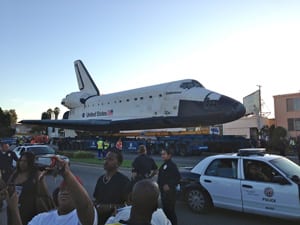To boldly go: pushing the limits of human exploration
By Clare S Ryan, on 26 October 2012

Space shuttle Endeavour in the streets
of Los Angeles en route to the California
ScienCenter (from vpisteve on Flickr).
Human exploration is big news. Felix Baumgartner recently made headlines around the world after becoming the first skydiver to fall faster than the speed of sound.
It seems we are fascinated by people who push the limits of what is possible, and so I was unsurprised to have to squeeze into Dr Kevin Fong’s recent Lunch Hour Lecture, ‘To boldly go’.
Dr Fong, who admits he has been at UCL “for-EVER”, studied both physics and medicine here and now leads a double life as a NASA scientist and a consultant anaesthetist at UCL Hospital.
As a physicist and a physiologist, he is in an unusual position to tell the story of human exploration and how we have triumphed over not just geographical boundaries, but also the limits of the human body.
Almost exactly 100 years ago, the bodies of Captain Scott and his Antarctica exploration team were found just 12 miles from their base camp, defeated by a combination of malnutrition and hypothermia.
At that time, there were still areas of the globe untrodden by human feet, and the most up-to-date maps included a vague area in the southern tip labelled ‘supposed Antarctica’.
Since then, humans have landed on the moon, founded an international space station and even have aspirations to go to Mars. These massive leaps, Kevin argues, are not just down to human curiosity and heroic individuals, but coincidental advances in engineering and medical science that have been exploited by explorers.
To highlight how far medical innovation has come since the time of Captain Scott, Kevin told the story of Anna Bagenholme, a Norwegian skier who was left trapped in ice after an accident.
By the time a helicopter had come to rescue Anna and taken her to hospital, her heart had not spontaneously beaten for nearly two hours, her core body temperature was just over 13 degrees centigrade (a third of normal temperature) and a blood sample showed her to be biochemically dead.
However, her medical team continued to try and resuscitate her and – truly miraculously – her heart started beating. After a week in intensive care, she opened her eyes. She is now a radiologist in the hospital that treated her and her case has re-written medical textbooks.
Anna’s survival can be seen as a happy accident – it was not planned, but a result of incremental innovations that came together to save her. In Anna’s case, advances in anaesthetics and blood transfusion, intensive care and emergency services all came together to preserve her life in extreme circumstances.
Kevin describes the human body as a complex organism “robust within very narrow limits”. The ability to protect life at extremes of height, depth and temperature has really come about since the Industrial Revolution.
The peak of this has been space exploration, where man not only got to the moon, but also was able to walk around in an environment which, without protection, would be lethal in little more than two minutes.
Skipping through the impressive history of NASA’s space shuttle programme, Kevin spent a few minutes marvelling at the latest development in the area – commercial space flight.
We are at the beginning of the next era of exploration in space, where wealthy individuals – for example, the founder of PayPal Elon Musk – are making the next leaps into the unknown.
Musk himself claims that, by the mid 2030s, it will be possible to sell everything you own and fly to Mars in one of his spaceships. And Kevin is starting to believe him.
The question that people ask about Felix Baumgartner or Elon Musk is the same as that asked about Captain Scott in 1912 or Neil Armstrong in 1969 – simply – why? Are they satisfying their curiosity? Furthering the advancement of human knowledge? Thrill seekers?
Kevin’s reply is just as simple: they don’t know why they’re going, or what the ultimate benefits of their voyages will be.
They go because of a desire to go further than anyone has done before, inspired by our collective imaginations and a belief that it is possible that they will survive to tell the tale.
“We are living on the boundary of science fiction and science fact,” he says. It’s where we’ve always been.
 Close
Close

